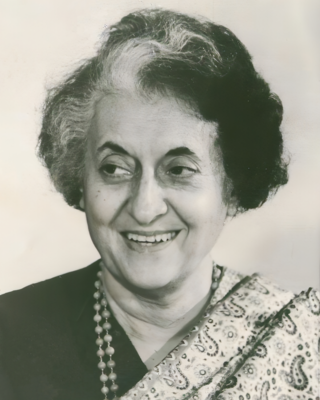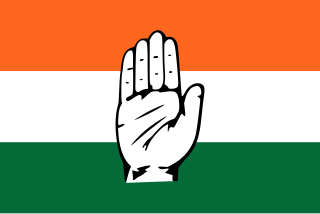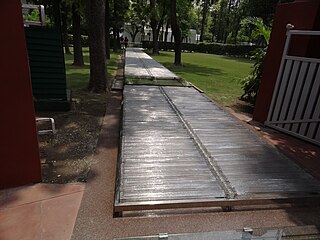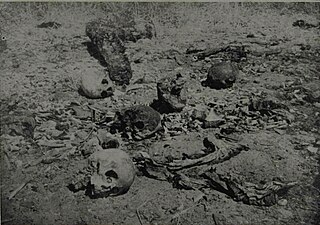
Indira Priyadarshini Gandhi was an Indian politician and stateswoman who served as the Prime Minister of India from 1966 to 1977 and again from 1980 until her assassination in 1984. She was India's first and,to date,only female prime minister,and a central figure in Indian politics as the leader of the Indian National Congress (INC). She was the daughter of Jawaharlal Nehru,the first prime minister of India,and the mother of Rajiv Gandhi,who succeeded her in office as the country's sixth prime minister. Gandhi's cumulative tenure of 15 years and 350 days makes her the second-longest-serving Indian prime minister after her father. Henry Kissinger described her as an "Iron Lady",a nickname that became associated with her tough personality.

Rajiv Gandhi was an Indian politician and the Prime Minister of India from 1984 to 1989. He took office after the assassination of his mother,then–prime minister Indira Gandhi,to become at the age of 40 the youngest Indian prime minister. He served until his defeat at the 1989 election,and then became Leader of the Opposition,Lok Sabha,resigning in December 1990,six months before his own assassination.

The Indian National Congress (INC),colloquially the Congress Party or simply the Congress,is a political party in India with deep roots in most regions of India. Founded on 28 December 1885,it was the first modern nationalist movement to emerge in the British Empire in Asia and Africa. From the late 19th century,and especially after 1920,under the leadership of Mahatma Gandhi,the Congress became the principal leader of the Indian independence movement. The Congress led India to independence from the United Kingdom,and significantly influenced other anti-colonial nationalist movements in the British Empire.
Arun Kumar Nehru was an Indian politician and columnist. He was member of the 9th Lok Sabha from Bilhaur as a Janata Dal leader. Earlier,he was member of the 7th and 8th Lok Sabhas from Rae Bareli on an Indian National Congress ticket.

Giani Zail Singh was an Indian politician from Punjab who served as the seventh president of India from 1982 to 1987 and 9th Chief Minister of Punjab. He was the first Sikh to become president.

Kamal Nath is an Indian politician who served as the 18th Chief Minister of Madhya Pradesh for approximately 15 months and resigned after a political crisis. He was the Leader of the Opposition in the Madhya Pradesh Legislative Assembly from March 2020 to April 2022.

Jagdish Tytler is an Indian politician and former Member of Parliament. He has held several government positions,the last being as Minister of State for Overseas Indian Affairs,a post from which he resigned after publication of a report by an official commission of inquiry,known as the Nanavati Commission.

The Indian National Congress was established when 72 representatives from all over the country met at Bombay in 1885. Prominent delegates included Dadabhai Naoroji,Surendranath Banerjee,Badruddin Tyabji,Pherozeshah Mehta,W. C. Banerjee,S. Ramaswami Mudaliar,S. Subramania Iyer,and Romesh Chunder Dutt. The Englishman Allan Octavian Hume,a former British civil servant,was one of the founding members of the Indian National Congress.
Sajjan Kumar is an Indian politician. He was elected to the Lok Sabha,the lower house of the Parliament of India from Outer Delhi as a member of the Indian National Congress but resigned from the primary membership of the party after he was convicted and sentenced to life imprisonment in a case relating to the 1984 anti-Sikh riots.
Girish Thakurlal Nanavati was an Indian judge who was a justice of the Supreme Court of India. After his retirement,he headed two commissions inquiring into the 1984 Anti-Sikh riots and the Godhra riots.
The Justice G.T. Nanavati commission was a one-man commission headed by Justice G.T. Nanavati,a retired Judge of the Supreme Court of India,appointed by the National Democratic Alliance (NDA) government in May 2000,to investigate the "killing of innocent sikhs" during the 1984 anti-Sikh riots. The commission was mandated to submit its report within six months,but it took five years. The report in two volumes was completed in February 2005.

General elections were held in India on 24,27 and 28 December 1984 soon after the assassination of previous Prime Minister,Indira Gandhi,though the vote in Assam and Punjab was delayed until 1985 due to ongoing insurgency.

Indian prime minister Indira Gandhi was assassinated at 9:30 a.m. on 31 October 1984 at her residence in Safdarjung Road,New Delhi. She was killed by her Sikh bodyguards,Satwant Singh and Beant Singh,in the aftermath of Operation Blue Star by the Indian Army between 1 and 8 June 1984 on the orders of Gandhi. The military operation was to remove Sikh militant Jarnail Singh Bhindranwale and other Sikh separatists from the Golden Temple of Harmandir Sahib in Amritsar,Punjab,the holiest site of Sikhism. The military action resulted in the death of many pilgrims as well as damage to the Akal Takht and the destruction of the Sikh Reference Library.

Harvinder Singh Phoolka,is a senior advocate of Delhi High Court,politician,human rights activist,and author. He served as the Leader of the Opposition in the Punjab Legislative Assembly.

The 1984 anti-Sikh riots,also known as the 1984 Sikh massacre,was a series of organised pogroms against Sikhs in India following the assassination of Indira Gandhi by her Sikh bodyguards. Government estimates project that about 2,800 Sikhs were killed in Delhi and 3,350 nationwide,whilst other sources estimate the number of deaths at about 8,000–17,000.

The Hondh-Chillar massacre refers to the killings of at least 32 Sikhs on 2 November 1984 in a hamlet in the Rewari district of Haryana,allegedly by a political mob during the 1984 anti-Sikh riots. The local police did not intervene in the massacre,pursue a first information report filed by survivors,or help resettle the survivors. The mass graves at the massacre were rediscovered in January 2011. A similar massacre occurred in nearby Pataudi.
Guru Radha Kishan (1925-1996) was an Indian Independence activist and Communist politician.
Chaudhary Bharat Singh (born 14 January 1915 in Nilothi Village,Delhi was an Indian politician,he was a member of Delhi Metropolitan Council for 4 terms and a former member of parliament in the 8th Lok Sabha from the Outer Delhi constituency,which was one of the largest constituencies not only in Delhi but also in the country. It was abolished in 2008.
General elections were held in India in 1984 soon after the assassination of previous Prime Minister,Indira Gandhi,though the vote in Assam and Punjab was delayed until 1985 due to ongoing fighting.
On September 5,1985,at 9:20 am member of the Delhi Metropolitan Council,close associate of Sanjay Gandhi,and Congress leader Arjun Dass was assassinated by 3 Sikhs in Delhi. The assassins were Harjinder Singh Jinda,Sukhdev Singh Sukha,and another member of Jinda's group. They killed Dass in revenge for his role in the 1984 anti-Sikh riots. Along with Arjun Dass his bodyguard,a constable,was killed and 6 others were injured.












